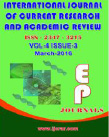Abstract Volume:4 Issue-3 Year-2016 Original Research Articles
 |
Online ISSN : 2347 - 3215 Issues : 12 per year Publisher : Excellent Publishers Email : editorijcret@gmail.com |
style="text-align: justify;">Congenital hearing loss affects about 1 in every 1000 live births. Cochlear implant is an effective therapeutic method for aural rehabilitation in patients suffering severe to profound hearing loss. The aim of this study was to compare the effects of the intravenous and inhalation anesthesia techniques on neuro-auditory threshold and stapedial reflex threshold responses. After winning the approval of the ethics committee of the university and obtaining informed consents, 110 patients with severe or profound bilateral sensorineural hearing loss, who were candidates for cochlear implant surgery were randomly selected and included in the clinical trial. In this trial, the effects of the total intravenous and inhalation anesthesia techniques on hemodynamic state of patients with cochlear implants. Variations in systolic and diastolic blood presses and mean arterial blood pressure were measured in both groups, and the FlACC scores of patients were examined upon entrance to recovery, and half an hour and one hour after examinations. In the 110 children in the two groups, no significant difference was observed in terms of the following parameters: age; weight; duration of anesthesia and surgery; mean FLACC scores upon entrance to recovery, and half an hour and one hour after examinations. No anesthesia side effect was observed in the two groups. During the surgery, it is important to the surgeon that the patient’s blood pressure remains low so that the surgery is improved. Hence, selection of the proper medicine for induction and hypotension control is important. Our results suggest that during the cochlear implant surgery, use of inhalation anesthetics should be avoided for achieving proper hypotension because those dosages of inhalation drugs, which lead to hypotension, can suppress or even fully eliminate stapedius reflex.
How to cite this article:
Masoud Naderpour, Yalda Jabari, Mehdi Banaei, Kasra Tavasoli and Mahnin Seyed Hejazi. 2016. Evaluation of volatile and intravenous anesthetics effects on the hemodynamic state in children undergoing cochlear implant surgery.Int.J.Curr.Res.Aca.Rev. 4(3): 220-225doi: http://dx.doi.org/10.20546/ijcrar.2016.403.024



Quick Navigation
- Print Article
- Full Text PDF
- How to Cite this Article
- on Google
- on Google Scholor
- Citation Alert By Google Scholar
